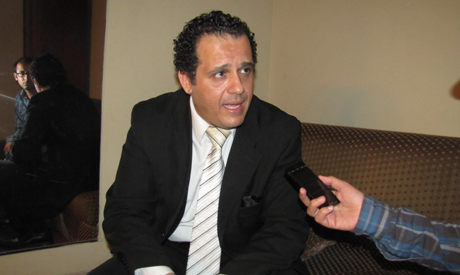
Nayer Nagui, principal conductor and artistic director of the Cairo Opera Orchestra, at the backstage, shortly after the cancelation of opera 'Aida' as sign of protest (Photo: Ayman Hafez)
Ahram Online spoke to Nayer Nagui, the principle conductor and artistic director of the Cairo Opera Orchestra, who lead a protest by opera house artists and staff on Tuesday.
The artists, who were supposed to perform Verdi’s opera Aida on the stage of the Cairo Opera House's main hall on Tuesday evening, instead stood on stage holding banners declaring their anger about the recent sacking of opera house head Ines Abdel-Dayem.
At the protest, Nagui gave a short but forceful speech on behalf of the performing team, declaring their abstention from performing the show in solidarity with Abdel-Dayem, who was sacked on Monday by the culture minister Alaa Abdel-Aziz.
In the interview with Ahram’s Arabic website and with Ahram Online after the protest on Tuesday, Nagui talked about the opera protest and the upcoming challenges facing the staff and musicians of the institution.
Ahram Online (AO): How did you come to take the decision to halt Aida and refrain from performing, for the first time in the history of the opera?
Nayer Nagui (NN): This is the first time an opera performance has been cancelled but it’s also the first time culture and arts are subjected to such a fierce attack, represented in the sackings of the senior officials of the ministry of culture, ending up with firing the head of the Cairo Opera House, Ines Abdel-Dayem. This is why our reaction had to be violent.
Cancelling a performance that includes work of over 300 artists isn’t easy, but we took the decision unanimously aiming at sending a message that arts and culture aren’t only a single red line but a multitude of red lines and that culture is the glue that keeps this society together. If culture collapses, the whole society collapses.
AO: What’s your next step?
NN: The speech that we delivered and our live protest on the stage in front of our audience were recorded and widely broadcasted. We will wait for the reaction of the ministry and the pro-culture part of society, and then we will think of our next step. Right now we have no clear plan regarding what we will do, but what I know is that the opera house completely rejects the abusive sacking of its head, Ines Abdel-Dayem.
AO: Do you protest the sacking of Abdel-Dayem as a person or because you fear the next head, who could be promoting the new minister’s policies?
NN: We protest the sackings of many successful senior officials of the Ministry of Culture, including Abdel-Dayem, who was the third senior culture official to be sacked after Ahmed Mujahid, head of the Egyptian General Book Authority, and Salah El-Meligy, head of the Fine Arts Sector.
We don’t know what the minister is up to and we don’t know what he means by his repeated statements “I will clean the ministry of corruption.” What corruption is he talking about?
…the Cairo Opera House is very successful; all the concerts and plays have an audience, even though the country is going through a hard time. The ministry has to back and support us instead of destroying everything we do.
AO: Do you think that the minister was targeting Abdel-Dayem in person when he sacked her or he was targeting the opera house?
NN: I have no answer for that question. We don’t really know. I have many unanswered question like: Why Ines Abeel-Dayem? Why the Cairo Opera House? Why now? I need clear answers for these questions or we will start to think that this is the settling of personal accounts, or possibly one of the attacks on culture from within as part of a plan to destroy Egyptian culture.
AO: Do you fear that appointing a new director of the opera could change its policy?
NN: Most of the artists and employees of the Cairo Opera House have been working together since the new opera was established 25 years ago. We go on stage together, we play music together. People who play music together become one team; that is to say that no one will be able to run this place from outside this team. The head of the opera should be one of us and of this team, and feel the spirit of a team.
AO: The upper house of parliament is calling for a decrease in your budget. Is the current budget sufficient for your activities?
NN: The current budget is barely sufficient to cover the expenses of a musical season. I have no idea of what the future will bring, but we will work until the last breath and the last penny.
Short link: